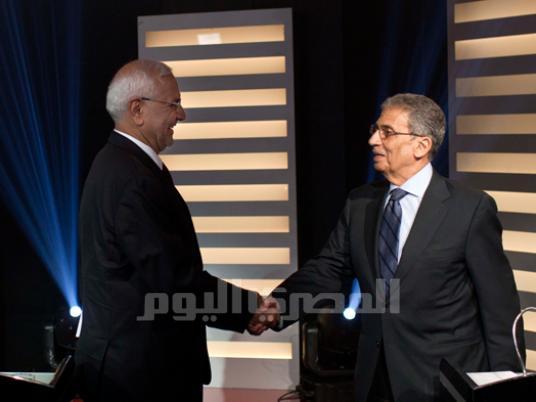
In the bad old days, presidential election campaigning in Egypt consisted of “here is Hosni Mubarak, you will vote for him,” with a slight variation in 2005 when the regime had an attack of democracy and allowed other Egyptian citizens to run in the elections on the condition that they realized they would not be allowed to win.
Opposition figures of the time, the Wafd Party’s Noaman Gomaa and the Ghad Party’s Ayman Nour, competed against Mubarak, running for his fifth term of office. Uniquely, Gomaa liked to wear a fez. In an even more unorthodox move, he used his campaign platform to praise Mubarak. He won 2.8 percent of the vote. Nour won 10 percent and was promptly imprisoned. Mubarak meanwhile wheeled out a slick campaign poster, featuring an image of him at a desk looking slightly drained, alongside which was written “leadership … and moving to the future” as well as “MUBARAK 2005” — a reference either to the year or how many terms of office he had left.
Still, those days are behind Egypt as the country grapples with its first presidential elections after the uprising that ousted Mubarak in 2011. Thirteen candidates have survived the Presidential Elections Commission (PEC) cull, and are now furiously roaming the country, in particular its satellite television studios. They have also launched media campaigns of varying degrees of sophistication and reach. Online videos have been currency in the campaigns.
This is not a groundbreaking observation, but all the presidential candidates are middle-aged or elderly men. Like middle-aged and elderly male presidential candidates the world over, Egypt’s bunch has a penchant for looking authoritative in suits, and this is in fact the mainstay of virtually all the campaigns.
Given Egypt’s history of strongmen presidents and the cult of the personality surrounding their tenures it is unsurprising that the candidates are trying to tap into this by focusing closely on their illustrious pasts, personal achievements and low tolerance of criminals. All except one candidate, that is.
Muslim Brotherhood member Mohamed Morsy was never meant to be a candidate, but his name was submitted in case first choice Khairat al-Shater was disqualified by the PEC, which he was.
Morsy’s nomination prompted the inevitable tidal wave of derisive scorn, and within hours online jokers had dubbed him “the spare tire.”
Shater’s candidacy had been based on him being the architect of the “nahda” (renaissance) project, a platform the Brothers say is comprehensive and all-encompassing. The Brotherhood got itself in a pickle when Morsy took the helm and found himself lumbered with Shater’s baby.
Its response has been essentially to shoehorn Morsy into the renaissance project. At times they don’t even bother, as in this video which features citizens talking about the qualities they seek in a president and which ends with a voice-over afterthought, “Mohamed Morsy: President of Egypt 2012.”
The Morsy campaign team faces an additional challenge in that the 61-year-old engineer has none of Shater’s fierce charisma or conviction. When he does get fired up during a speech he brings to mind a gentle man arguing over a supermarket car park space.
In this video Morsy gives a speech while Shater sits next to him, looking curmudgeonly as usual. Later we see Morsy walking next to Shater, who towers over him looking presidential. It's like ringing a hair salon and being advised that your favorite hairdresser has no appointments but his junior is just as good.
Ahmed Shafiq is a military man, which perhaps explains why his first bit of campaigning relied on stealth and subterfuge, in the form of mysterious billboards that popped up all over Cairo in April, on which were written “The President.” By May, Shafiq’s face had been plastered over them. Cleverly, this campaign strategy broke the ban on official campaigning before 1 May while not actually doing so.
The rest of Shafiq’s campaign is run of the mill, and like the other big players he relies on the usual mix of videos and a social networking site updates deluge.
What is unusual is an odd 8-minute video on his official YouTube channel showing a delegation of young men from Imbaba on a visit to Shafiq’s home to apologize for other Imbaba residents driving him out of Imbaba on a campaign visit. The meeting takes place in Shafiq’s busy living room, the walls and surfaces of which are almost entirely obscured by knick knacks and assorted clutter. One of Shafiq’s campaign promises is to end the “chaos” left by the security vacuum within 24 hours of being elected, and one wonders whether he might like to start this enterprise in his own home.
Amr Moussa is one of the few candidates who allows himself to grin in his campaign propaganda. One poster shows him doing this with his arms crossed across his chest, and the immediate effect is “I am chef Amr, welcome to my kitchen.” Like Shafiq and the rest, Moussa mobilized members of the Egyptian general public for his campaign video.
He uses said citizens to complete his sentences in an ever increasing crescendo of vigor and enthusiasm while he shakes his fist from the top floor of a skyscraper and declares that Egyptians are up to the challenge of building Egypt while the working class plebs echo him in workshops and fields. The effect is slightly undermined by the video’s resemblance to an ad for ghee currently showing on Egyptian television.
Abdel Moneim Abouel Fotouh is arguably the king of multimedia campaigning.
His offerings include a slick video life story, a charming puppet show and a 1-minute video narrated by himself in which frankly he sounds vaguely like Forrest Gump.
The soundtrack has a strange children’s fantasy film type theme. The video ends with an unexplainable scene of Abouel Fotouh pulling aside net curtains to look through a window like a man about to reprimand a cat for defecating on his lawn.
At the other end of the spending spectrum are Mohamed Selim al-Awa and Khaled Ali.
Awa has a series of short, 20-second videos describing what justice means to him, which includes queuing and subjecting foreigners in Cairo airport to the same indignities Egyptians suffer abroad.
The ever-serious Ali offers us an 8-minute video describing his vision of Interior Ministry reform. The first 30 seconds are a gore movie of torture and protest scenes interspersed with an out-of-focus Ali doing verbal battle with wind noise on a rooftop.
Choosing to ignore Ali’s charisma and public speaking skills, the video makers then cut to an academic giving an interminable monologue about police reform next to a bookcase.
Speaking of bookcases, we are given repeated glimpses of the bookcase of little-known candidate Mahmoud Hossam Eddin Galal, policeman turned businessman turned politician.
His 8-minute campaign video, apparently filmed using a mobile phone camera, describes Galal’s life story with heavy emphasis on his police and army background and connections and charity work. In style, the video, centered around the motif of Galal’s bookcase, is reminiscent of 1990s late-night advertising for homeopathic slimming remedies. But in its poverty there is perhaps a message: In the new Egypt there is room for all, even bookcase-obsessed former members of the Interior Ministry.




